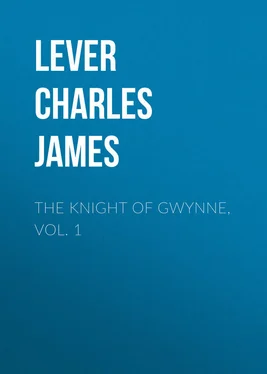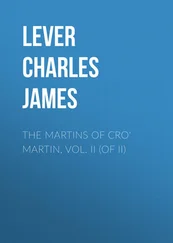Charles Lever - The Knight Of Gwynne, Vol. 1
Здесь есть возможность читать онлайн «Charles Lever - The Knight Of Gwynne, Vol. 1» — ознакомительный отрывок электронной книги совершенно бесплатно, а после прочтения отрывка купить полную версию. В некоторых случаях можно слушать аудио, скачать через торрент в формате fb2 и присутствует краткое содержание. Жанр: foreign_antique, foreign_prose, на английском языке. Описание произведения, (предисловие) а так же отзывы посетителей доступны на портале библиотеки ЛибКат.
- Название:The Knight Of Gwynne, Vol. 1
- Автор:
- Жанр:
- Год:неизвестен
- ISBN:нет данных
- Рейтинг книги:3 / 5. Голосов: 1
-
Избранное:Добавить в избранное
- Отзывы:
-
Ваша оценка:
- 60
- 1
- 2
- 3
- 4
- 5
The Knight Of Gwynne, Vol. 1: краткое содержание, описание и аннотация
Предлагаем к чтению аннотацию, описание, краткое содержание или предисловие (зависит от того, что написал сам автор книги «The Knight Of Gwynne, Vol. 1»). Если вы не нашли необходимую информацию о книге — напишите в комментариях, мы постараемся отыскать её.
The Knight Of Gwynne, Vol. 1 — читать онлайн ознакомительный отрывок
Ниже представлен текст книги, разбитый по страницам. Система сохранения места последней прочитанной страницы, позволяет с удобством читать онлайн бесплатно книгу «The Knight Of Gwynne, Vol. 1», без необходимости каждый раз заново искать на чём Вы остановились. Поставьте закладку, и сможете в любой момент перейти на страницу, на которой закончили чтение.
Интервал:
Закладка:
The third figure – strikingly unlike the other two – was a man of fifty or thereabouts, short and plethoric. His features, rosy and sensual, were lit up by two gray eyes whose twinkle was an incessant provocative to laughter. The mouth was, however, the great index to his character. It was large and full, the under lip slightly projecting, – a circumstance perhaps acquired in the long habit of a life where the tasting function had been actively employed; for Con Heffernan was a gourmand of the first water, and the most critical judge of a vintage the island could boast. Two fingers of either hand were inserted in the capacious pockets of a white vest, while, his head jauntily leaning to one side, he sat the very ideal of self-satisfied ease and contentment. The aplomb – why should there be a French word for an English quality? – he possessed was not the vulgar ease of a presuming or underbred man, – far from it; it was the impress of certain gifts which gave him an acknowledged superiority in the society he moved in. He was shrewd, without over-caution; he was ready-witted, but never rash; he possessed that rare combination of quick intelligence with strong powers of judgment; and, above all, he knew men, or at least such specimens of the race as came before him in a varied life, well and thoroughly.
If he had a weak point in his character, it was a love of popularity, – not that vulgar mob-worship which some men court and seek after; no, it was the estimation of his own class and set he desired to obtain. He was proud of his social position, and nervously sensitive in whatever might prejudice or endanger it. His enemies – and Con was too able a man not to have made some – said that his low origin was the secret of his nature; that his ambiguous position in society demanded exertions uncalled for from others less equivocally circumstanced; and that Mr. Heffernan was, in secret, very far from esteeming the high and titled associates with whom his daily life brought him in contact. If this were the case, he was assuredly a consummate actor. No man ever went through a longer or more searching trial unscathed, nor could an expression be quoted, or an act mentioned, in which he derogated, even for a moment, from the habits of “his order.”
“You never did the thing better in your life, my Lord,” said Con, as the door closed upon the last departing guest. “You hit off Jack Massy to perfection; and as for Watson, though he said nothing at the time, I ‘ll wager my roan cob against Deane Moore’s hackney – long odds, I fancy – that you find him at the Treasury to-morrow morning, with a sly request for five minutes’ private conversation.”
“I’m of your mind, Heffernan. I saw that he took the bait, – indeed, to do the gentlemen justice, they are all open to conviction.”
“You surely cannot blame them,” said Con, “if they take a more conciliating view of your Lordship’s opinions when assisted by such claret as this: this is old ‘72, if I mistake not.”
“They sold it to me as such; but I own to you I ‘m the poorest connoisseur in the world as regards wine. Some one remarked this evening that the ‘95 was richer in bouquet.”
“It was Edward Harvey, my Lord. I heard him; but that was the year he got his baronetcy, and he thinks the sun never shone so brightly before; his father was selling Balbriggan stockings when this grape was ripening, and now, the son has more than one foot on the steps of the peerage.” This was said with a short, quick glance beneath the eyelids, and evidently more as a feeler than with any strong conviction of its accuracy.
“No Government can afford to neglect its supporters, and the acknowledgments must be proportioned to the sacrifices, as well as to the abilities of the individuals who second it.”
“By Jove! if these gentlemen are in the market,” said Forester, who broke silence for the first time, “I don’t wonder at their price being a high one; in consenting to the ‘Union,’ they are virtually voting their own annihilation.”
“By no means,” said the Secretary, calmly; “the field open to their ambition is imperial, and not provincial; the English Parliament will form an arena for the display of ability as wide surely as this of Dublin. Men of note and capacity will not be less rewarded: the losers will be the small talkers, county squires of noisy politics, and crafty lawyers of no principles; they will, perhaps, be obliged to remain at home and look after their own affairs; but will the country be the worse for that, while the advantages to trade and commerce are inconceivable?”
“I agree with you there,” said Con; “we are likely to increase our exports, by sending every clever fellow out of the country.”
“Why not, if the market be a better one?”
“Would n’t you spare us a few luxuries for home consumption?” said Con, as he smacked his lips and looked at his glass through the candle.
His Lordship paid no attention to the remark, but, taking a small tablet from his waistcoat-pocket, seemed to study its contents. “Are we certain of Cuffe; is he pledged to us, Heffernan?”
“Yes, my Lord, he has no help for it; we are sure of him; he owes the Crown eleven thousand pounds, and says the only ambition he possesses is to make the debt twelve, and never pay it.”
“What of that canting fellow from the North, – New-land?”
“He accepts your terms conditionally, my Lord,” said Con, with a sly roll of his eye. “If the arguments are equal to your liberality, he will vote for you; but as yet he does not see the advantages of a Union.”
“Not see them!” said Lord Castlereagh, with a look of irony; “why did you not let him look at them from your own windows, Heffernan? The view is enchanting for the Barrack Department.”
“The poor man is short-sighted,” said Con, with a sigh, “and never could stretch his vision beyond the Custom House.”
“Be it so, in the devil’s name; a commissioner more or less shall never, stop us!”
“What a set of rascals,” muttered Forester between his teeth, as he tossed off a bumper to swallow his indignation.
“Well, Forester, what of your mission? Have you heard from your friend Darcy?”
“Yes; I have his note here. He cannot come over just now, but he has given me an introduction to his father, and pledges himself I shall be well received.”
“What Darcy is that?” said Heffernan.
“The Knight of Gwynne,” said his Lordship; “do you know him?”
“I believe, my Lord, there is not a gentleman in Ireland who could not say yes to that question; while west of the Shannon, Maurice Darcy is a name to swear by.”
“We want such a man much,” said the Secretary, in a low, distinct utterance; “some well-known leader of public opinion is of great value just now. How does he vote usually? I don’t see his name in the divisions.”
“Oh, he rarely comes up to town, never liked Parliament; but when he did attend the House, he usually sat with the Opposition, but, without linking himself to party, spoke and voted independently, and, strange to say, made considerable impression by conduct which in any other man would have proved an utter failure.”
“Did he speak well, then?”
“For the first five minutes you could think of nothing but his look and appearance; he was the handsomest man in the House, a little too particular, perhaps, in dress, but never finical; as he went on, however, the easy fluency of his language, the grace and elegance of his style, and the frank openness of his statements, carried his hearers with him; and many who were guarded enough against the practised power of the great speakers were entrapped by the unstudied, manly tone of the Knight of Gwynne. You say truly, he would be a great card in your hands at this time.”
Читать дальшеИнтервал:
Закладка:
Похожие книги на «The Knight Of Gwynne, Vol. 1»
Представляем Вашему вниманию похожие книги на «The Knight Of Gwynne, Vol. 1» списком для выбора. Мы отобрали схожую по названию и смыслу литературу в надежде предоставить читателям больше вариантов отыскать новые, интересные, ещё непрочитанные произведения.
Обсуждение, отзывы о книге «The Knight Of Gwynne, Vol. 1» и просто собственные мнения читателей. Оставьте ваши комментарии, напишите, что Вы думаете о произведении, его смысле или главных героях. Укажите что конкретно понравилось, а что нет, и почему Вы так считаете.












